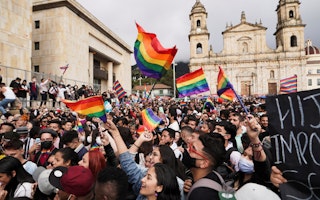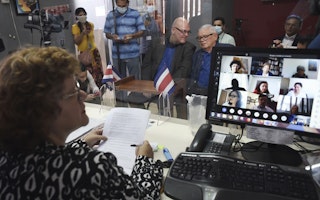After Illegal Raid of Gay Bar, Atlanta Police Required to Reform Conduct
By Sara J. Totonchi
In 2009, a paramilitary, SWAT-type force of Atlanta police officers stormed into a gay bar called the Atlanta Eagle without a warrant, claiming to be searching for public sex, drugs, and illegal weapons. The police forced dozens of bar patrons—who prior to the raid been enjoying their drinks, dancing, and socializing—to lie face-down on the floor, which was covered with spilled beer, dirt, and broken glass. Patrons who were not suspected of any criminal activity were illegally searched; police officers emptied their pockets, confiscated their IDs, and entered every patron’s name into a police computer.
Several victims of the raid successfully sued the Atlanta Police Department. The agency was forced to change many unconstitutional and discriminatory policies and award damages to the patrons they victimized. Late last month, the victims collected their checks.
The police never explained why they were there, and when patrons asked questions, they were told to “shut the f--- up.” Some patrons were told they would be hit in the head with a bar stool if they asked any questions, and some were shoved to the ground and kicked by the officers. Several patrons report that some officers made racist and anti-gay slurs. One patron was forced to lie on the floor even though he had injured his back in the Iraq War. Not a single patron was charged with any crime, and no weapons, drugs, or sex was anywhere to be found.
The Southern Center for Human Rights (SCHR), an Open Society Foundations grantee, filed a federal lawsuit against the Atlanta Police Department, Calhoun v. Pennington [pdf], in which we represented the group of men who were victimized by the raid on the Atlanta Eagle. This is one of SCHR’s first ventures into police practices prior to arrest, and reflects our efforts to address schemes aimed at targeting groups of law abiding citizens to try to drum up arrests.
"The Atlanta Eagle is one of my favorite bars. I usually go there to drink a beer, unwind, and watch a football game after rehearsing with the Gay Men's Chorus," said Mark Danak, an SCHR client named in the case. "But that Thursday night was a very serious experience that I will never forget."
In conjunction with Dan Grossman, a heroic private lawyer, and Lambda Legal Defense, we represented a group of men who were victimized by the raid. In the face of litigation, the Atlanta police chief stood in front of reporters and admitted that it is standard practice for the police to detain people without individualized probable cause and search them without reasonable suspicion.
From the very beginning of the litigation, we called out the police department’s policy of detaining, searching, and taking IDs from every person at the Atlanta Eagle raid as a violation of the Fourth Amendment’s protection against unreasonable searches and seizures. After more than a year of litigation—during which details of many other incidents of Atlanta police misconduct continued to emerge—the City of Atlanta finally agreed to settle the lawsuit and apologized to the patrons and the community.
Most importantly, the terms of the settlement force the Atlanta Police Department to address the many unconstitutional policies on their books. These reforms will transform the way the police department carries out searches, seizures, and arrests of citizens and makes other changes to protect the public from police misconduct. Other police policies were found to be in fact unconstitutional—such as stopping and searching people without reasonable suspicion or warrants—have been completely revoked from the standard operating procedures of the Atlanta Police Department.
Additionally, the settlement requires other reforms that are designed to deter police misconduct and hold Atlanta police officers accountable for their actions. For example, all Atlanta police officers will have to go through training to educate them on the new procedures to reduce the chance a scenario like the Eagle raid would happen again. And from now forward, the Atlanta Police Department must investigate and fully resolve all citizen complaints of police misconduct of any kind within 180 days of when the complaint is made.
Sara J. Totonchi is executive director of law offices at the Southern Center for Human Rights.


